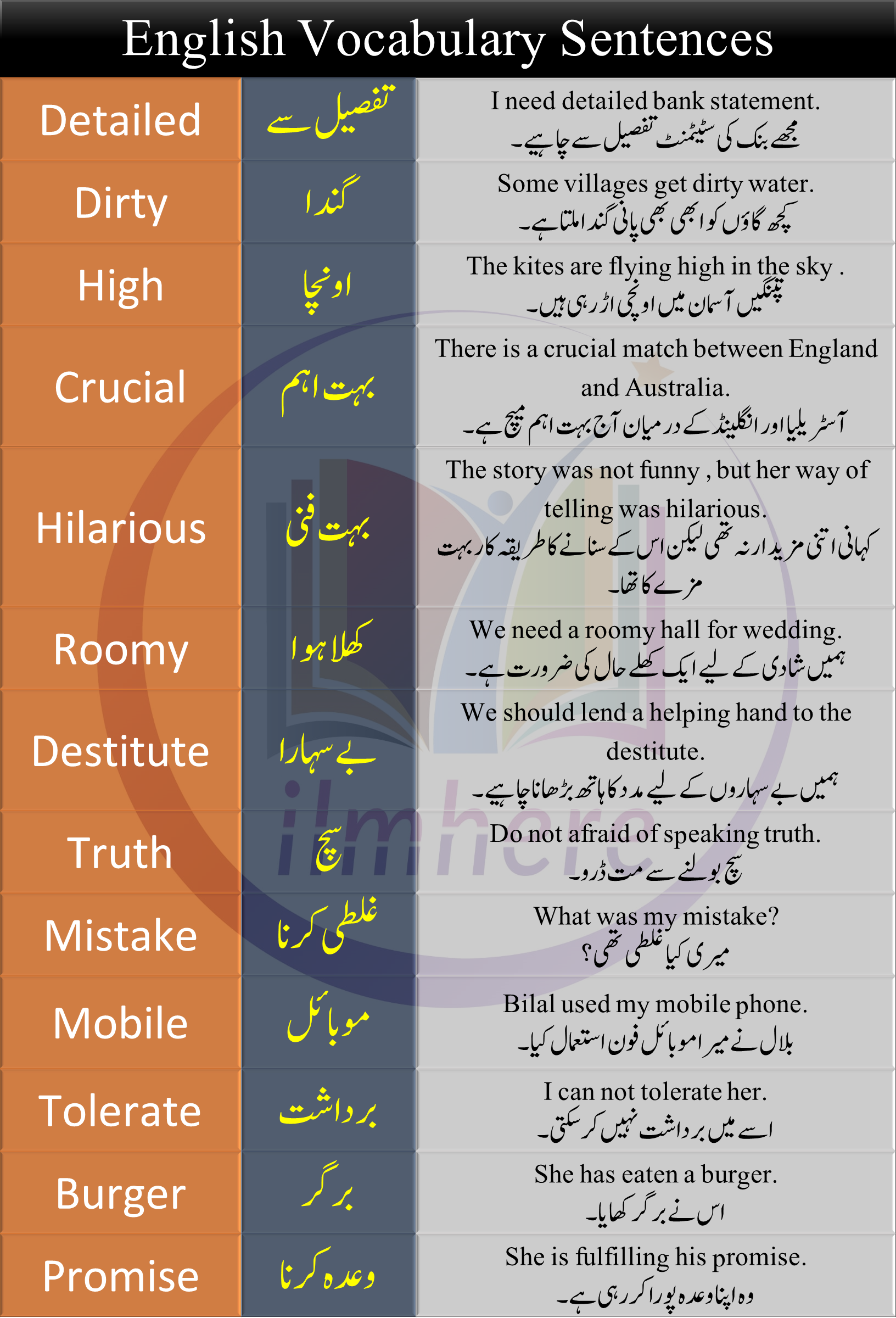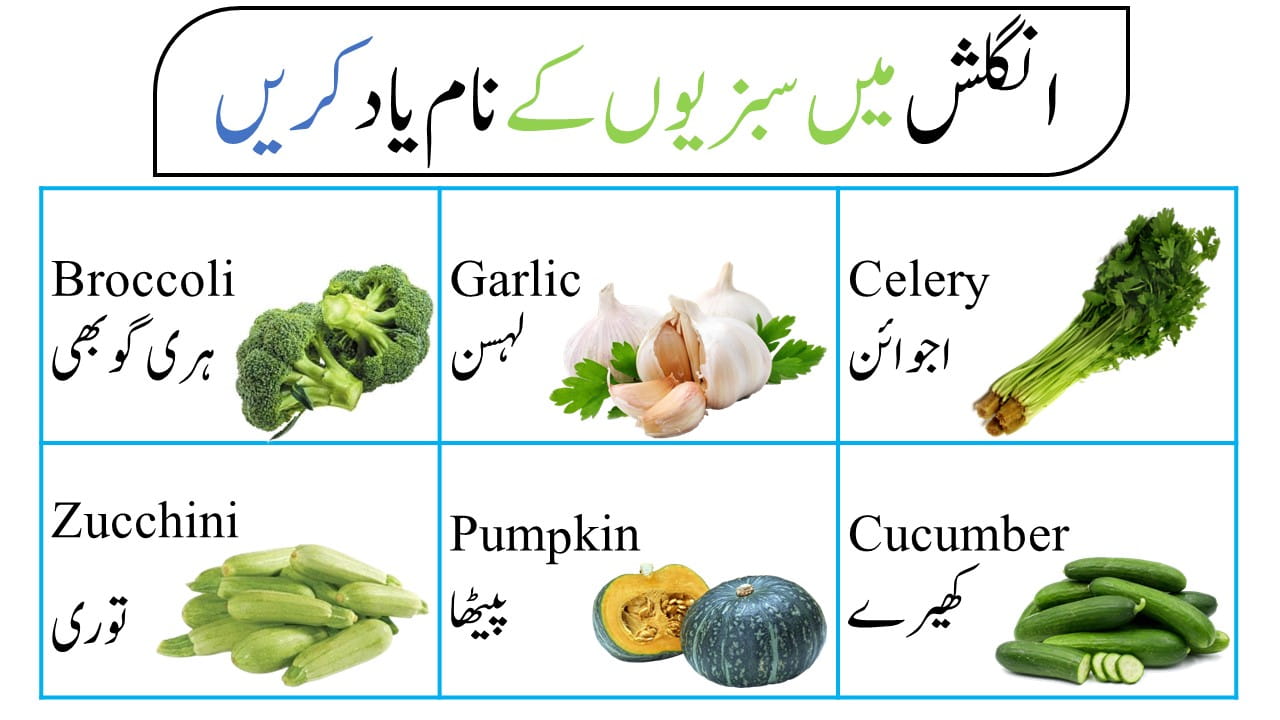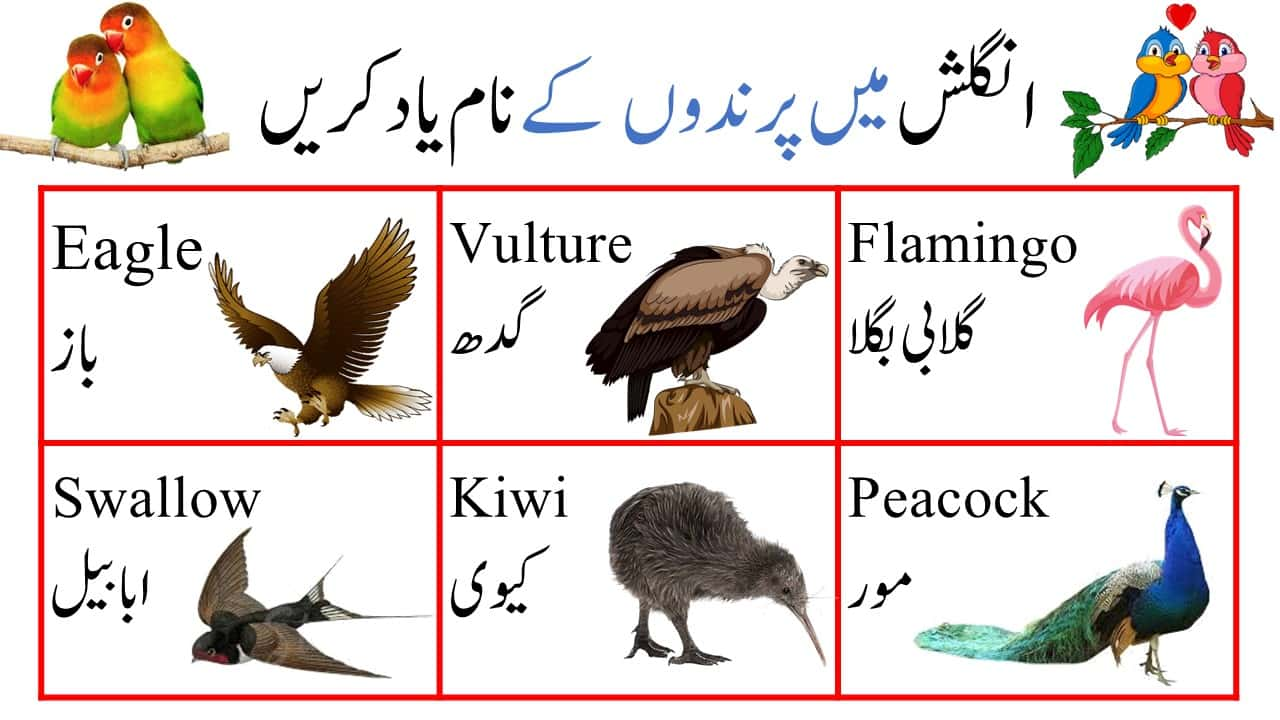Advanced English vocabulary for daily use and sentences | list of daily used English Words
Advanced English vocabulary for daily use and sentences In Urdu and English
Whether you’re a student, or professional and Want to Improve your English. Don’t worry. this guide is designed to help you expand your vocabulary and express yourself more effectively For Daily Life Conservation. With its easy-to-use format and clear explanations, this resource is ideal for learners of all levels.
So if you’re ready to take your English language skills to the next level, be sure to check out Advanced English vocabulary for daily use and sentences today!
list of Impressive English To Urdu & Hindi Sentences With Vocabulary
| Help | مدد – mdd | I am stuck in a storm, help me.
میں طوفان میں پھنس گیا ہوں، میری مدد کریں۔ may toofan may phns gia hoo,meri mdd krai. |
| Tired | تھکے ہوۓ – thakai hui. | After the movie, we were so tired that we couldn’t go shopping.
ہم فلم دیکھنے کے بعد اتنے تھکے ہوۓ تھے کہ بازار نہ جاسکے۔ hum film dekhnay kay baad itny thakay hui thy bazar na jasky. |
| Exhausted | زیادہ تھکے ہونا – zada thaka hona. | By the time we reached home, we were exhausted.
جب تک ہم گھر پہنچے ہم بہت تھک چکے تھے۔ jab tak hum ghar pohnchay hum boht thak chukay thy. |
| Bad | برا – bura | I have a bad day.
میرا پورا دن خراب گیا mera pura din khrab gia. |
| Awful | زیادہ خراب – zada khrab | I don’t like that restaurant, Their food is awful.
مجھے وہ ریسٹورنٹ بلکل پسند نہیں ، ان کا کھانا بہت خراب ہوتا ہے۔ mujhy woh resturent bilkl pasand nahi , inka khana boht khrab hai. |
| Tasty | مزیدار ، لذیذ – mazedar ya lazeez | The cake is tasty.
کیک مزیدار ہے۔ kaik mazedar hai. |
| Delicious | بہت مزیدار – boht mazedar | The apples are delicious.
سیب بہت مزیدار ہیں۔ saib boht mazedar |
| Eagar | بے چین – bachain | I am eager to watch Salman’s next film.
میں سلمان کی نئی فلم دیکھنے کے لیے بے چین ہوں۔ may salman ki nai film dekhny ky lia bechain hoo. |
| Keen | بہت اتاولہ – boht atawla | He is keen to go to Karachi.
وہ کراچی جاننے کے لیے بہت اتاولہ ہے۔ woh Karachi jany ky lia boht atawla hay. |
| Quiet | خاموش / چپ رہنا – khamosh rehna ya chup rehna | Bilal is always quiet in class.
بلال ہمیشہ کلاس میں خاموش رہتا ہے۔ |
| Silent | بلکل خاموش رہنا – khamosh rehna | Bilal, I have been silent so far.
بلال، میں اب تک بلکل خاموش رہا ہوں۔ |
| Fast | تیز چلنا – tez chlna | The bus is running fast.
بس تیز چل رہی ہے۔ bs tez chl rhi hay. |
| Quick | بہت تیز – boht tez | Bilal is quick in learning anything new.
بلال کچھ بھی سیکھنے میں بہت تیز ہے۔ Bilal kuch bhi seekhny may boht taiz hay. |

English vocabulary for daily use with Urdu meaning
English vocabulary for daily use includes common words and phrases that are used in everyday communication. These words and phrases are essential for daily conversations, reading and writing in English. Some common words that are used in daily conversations include in the following list.
Here is the list of English to Urdu Phrase With Vocabulary With Meaning.
| Expensive | مہنگا | This home is expensive.
یہ گھر مہنگا ہے۔ |
| Costly | بہت مہنگا | It will be a costly affair you.
تمہیں یہ سودا بہت مہنگا پڑے گا ۔ |
| Tiny | بہت چھوٹی | The building look tiny from an Aeroplan.
جہاز سے عمارت بہت چھوٹی لگتی ہے۔ |
| Dry | خشک یا سوکھ جانا | My skin becomes dry in winters.
میری جلد سردیوں میں خشک ہوجاتی ہے۔ |
| Deafening | کان خراب کردینے والا شور | The sound of crackers is deafening.
پٹاخوں کی آواز کا بہت شور ہوتا ہے۔ |
| Starving | بھوک سے مرے جانا | In many countries, people are starving.
کئی ملکوں میں لوگ بھوک سے مر رہے ہیں ۔ |
| Sure | یقین ہونا | I am sure Bilal will come tomorrow.
مجھے یقین ہے بلال کل آئے گا۔ |
| Certain | پورا یقین | Are you certain that the principal on leave today?
کیا تمہیں پورا یقین ہے پرنسپل آج چھٹی پر ہے؟. |
| Stupid | بے وقوفی | It was stupid to take the medicine on an empty stomach.
خالی پیٹ دوائی لینا ایک بے وقوفی تھی۔ |
| Furious | بہت غصہ آنا | I get furious ,when I see you sitting idle.
تمہیں خالی بیٹھا دیکھ کر مجھے بہت غصہ آتا ہے |
| Freezing | بہت ٹھنڈا | Don’t visit Kashmir this month , it is freezing.
اس مہینے کشمیر مت جاؤ وہاں بہت ٹھنڈ ہے۔ |
| Worried | پریشان ہونا | I’m worried about my result.
میں ریزلٹ کو لے کے پریشان ہوں۔ |
| Wealthy | بہت امیر | Only the wealthy can buy this car.
صرف امیر ہی یہ کار لے سکتے ہیں۔ |
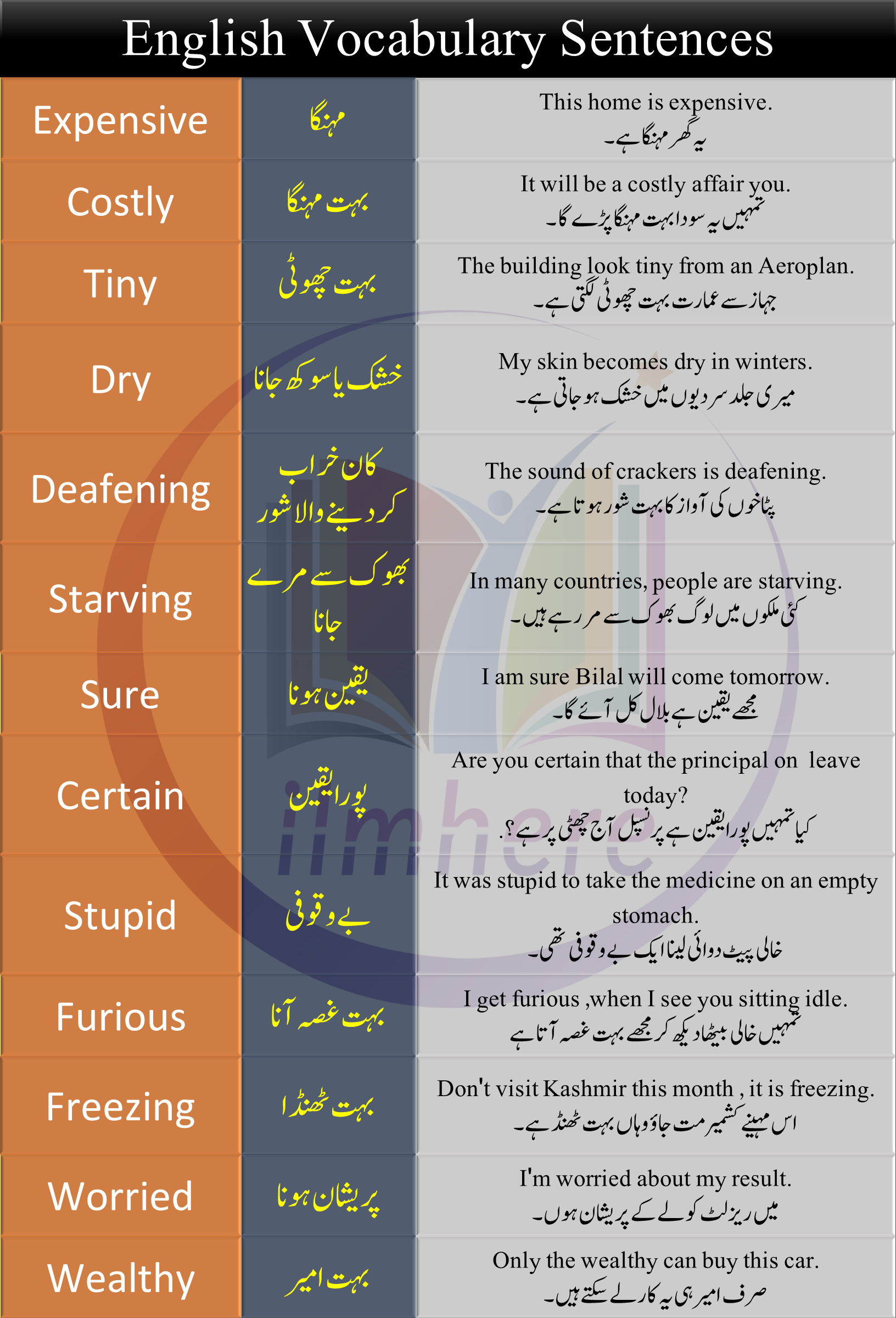
Impressive vocabulary for everyday use In Urdu and English
There are many people who know a lot of words, but there are not many people who know impressive words, which is why we all need to learn from this article and improve our English vocabulary with its help of it. English Vocabulary is the most important part of our language. With a good vocabulary, we can express ourselves in a good way. That’s why we have given you words that you can memorize to improve your English. I hope the Advanced English vocabulary for daily use and sentences are useful for you.
English To Urdu Phrase With Meanings For Daily Life
| Often | اکثر / کئی بار | Do you visit Lahore often?.
کیا تم اکثر لاہور جاتے ہو ؟۔ |
| Frequently | بار بار | Ali falls ill frequently.
علی بار بار بیمار پڑ جاتا ہے ۔ |
| Obese | بہت موٹا | Shahbaz have become obese.
شہباز بہت موٹا ہوگیا ہے۔ |
| Perfect | مکمل | You both are perfect each other.
تم دونوں ایک دوسرے کے لیے مکمل ہو۔ |
| Flawless | کوئی بھی کمی نہ ہونا | This painting is flawless.
یہ پینٹنگ بلکل مکمل ہے۔ |
| Effortlessly | آسانی | He speaks Urdu Effortlessly.
وہ بہت آسانی سے اردو بول لیتا ہے۔ |
| Skinny | پتلی | Nadia is skinny , this dress will not fit her.
نادیہ بہت پتلی ہے اسے یہ ڈریس فٹ نہیں آئے گا۔ |
| Skeletal | ہڈیوں کا ڈھانچہ | When I saw him last time , he looked skeletal.
جب میں نے اسے آخری بار دیکھا تھا ، تو وہ ہڈیوں کا ڈھانچہ لگتا تھا۔ |
| Deep | گہری سوچ | Bilal is lost deep in thoughts.
بلال گہری سوچ میں کھویا ہوا ہے۔ |
| Profound | گہرا علم | He has profound knowledge of Urdu.
اسے اردو کا بہت گہرا علم ہے۔ |
| Thrilled | بہت پرجوش | I am thrilled about the upcoming holidays.
میں آنے والی چھٹیوں کو لے کے بہت پر جوش ہوں۔ |
| Lively | زندہ دل | Your uncle is a lively person.
تمہارے انکل زندہ دل انسان ہیں۔ |
| Perplexed | ہکے بکے رہنا | The students were perplexed to see a difference question paper.
طالب علم پیپر کے مشکل سوال کو دیکھ کر ہکے بکے رہ گئے۔ |
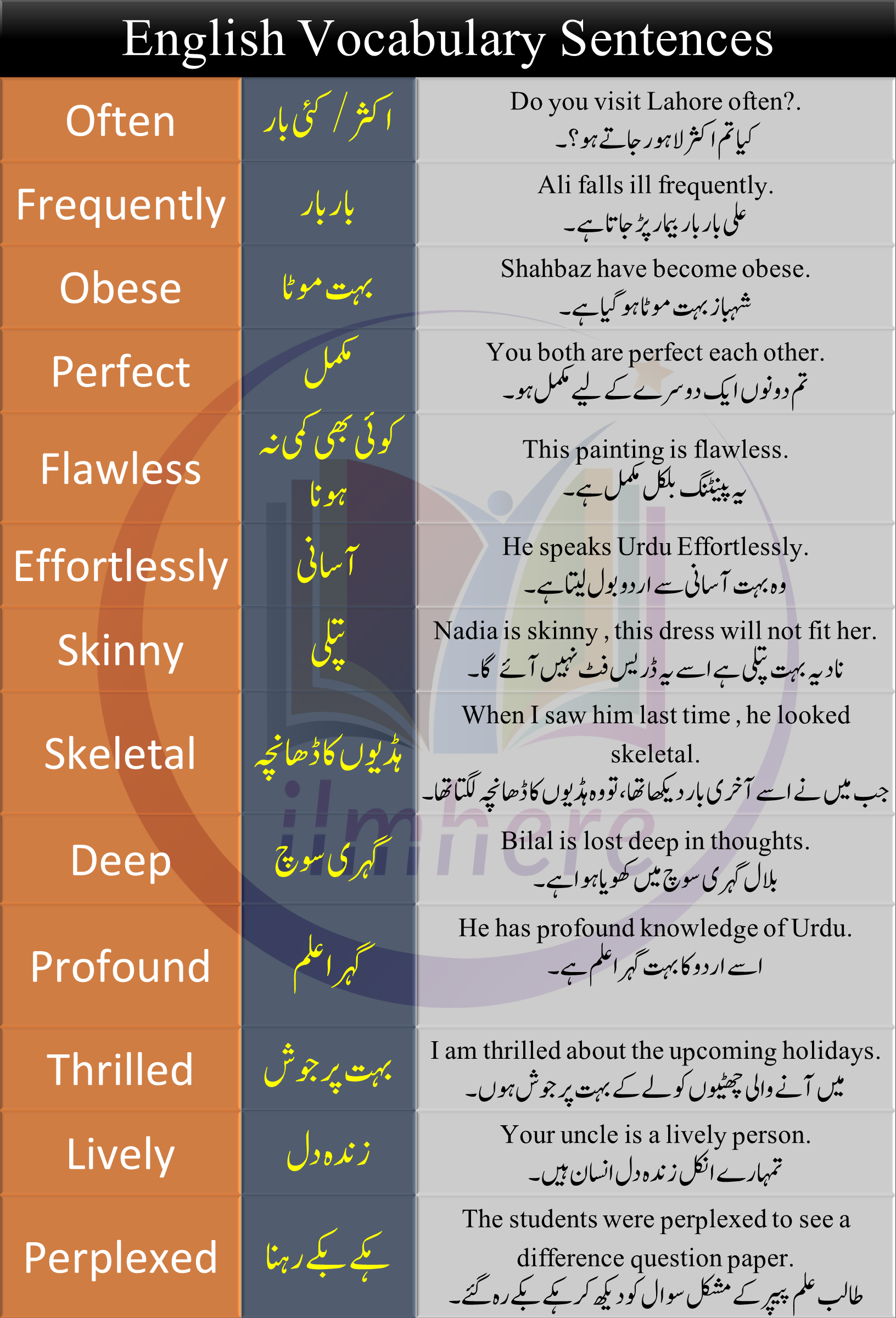
| Detailed | تفصیل سے | I need detailed bank statement.
مجھے بنک کی سٹیٹمنٹ تفصیل سے چاہیے۔ |
| Dirty | گندا | Some villages get dirty water.
کچھ گاؤں کو ابھی بھی پانی گندا ملتا ہے۔ |
| High | اونچا | The kites are flying high in the sky .
پتنگیں آسمان میں اونچی اڑ رہی ہیں۔ |
| Crucial | بہت اہم | There is a crucial match between England and Australia.
آسٹریلیا اور انگلینڈ کے درمیان آج بہت اہم میچ ہے۔ |
| Hilarious | بہت فنی | The story was not funny , but her way of telling was hilarious.
کہانی اتنی مزیدار نہ تھی لیکن اس کے سنانے کا طریقہ کار بہت مزے کا تھا۔ |
| Roomy | کھلا ہوا | We need a roomy hall for wedding.
ہمیں شادی کے لیے ایک کھلے حال کی ضرورت ہے۔ |
| Destitute | بے سہارا | We should lend a helping hand to the destitute.
ہمیں بے سہاروں کے لیے مدد کا ہاتھ بڑھانا چاہیے۔ |
| Truth | سچ | Do not afraid of speaking truth.
سچ بولنے سے مت ڈرو۔ |
| Mistake | غلطی کرنا | What was my mistake?
میری کیا غلطی تھی؟ |
| Mobile | موبائل | Bilal used my mobile phone.
بلال نے میرا موبائل فون استعمال کیا۔ |
| Tolerate | برداشت | I can not tolerate her.
اسے میں برداشت نہیں کرسکتی۔ |
| Burger | برگر | She has eaten a burger.
اس نے برگر کھایا۔ |
| Promise | وعدہ کرنا | She is fulfilling his promise.
وہ اپنا وعدہ پورا کررہی ہے۔ |
Free Download Of English To Urdu Vocabulary and Sentences
Advanced English vocabulary pdf download is an excellent resource for individuals who are interested in enhancing their language skills. These pdf downloads provide a comprehensive collection of advanced vocabulary words that can help one communicate effectively in various settings. for more interesting English vocabulary sentences visit this link.


